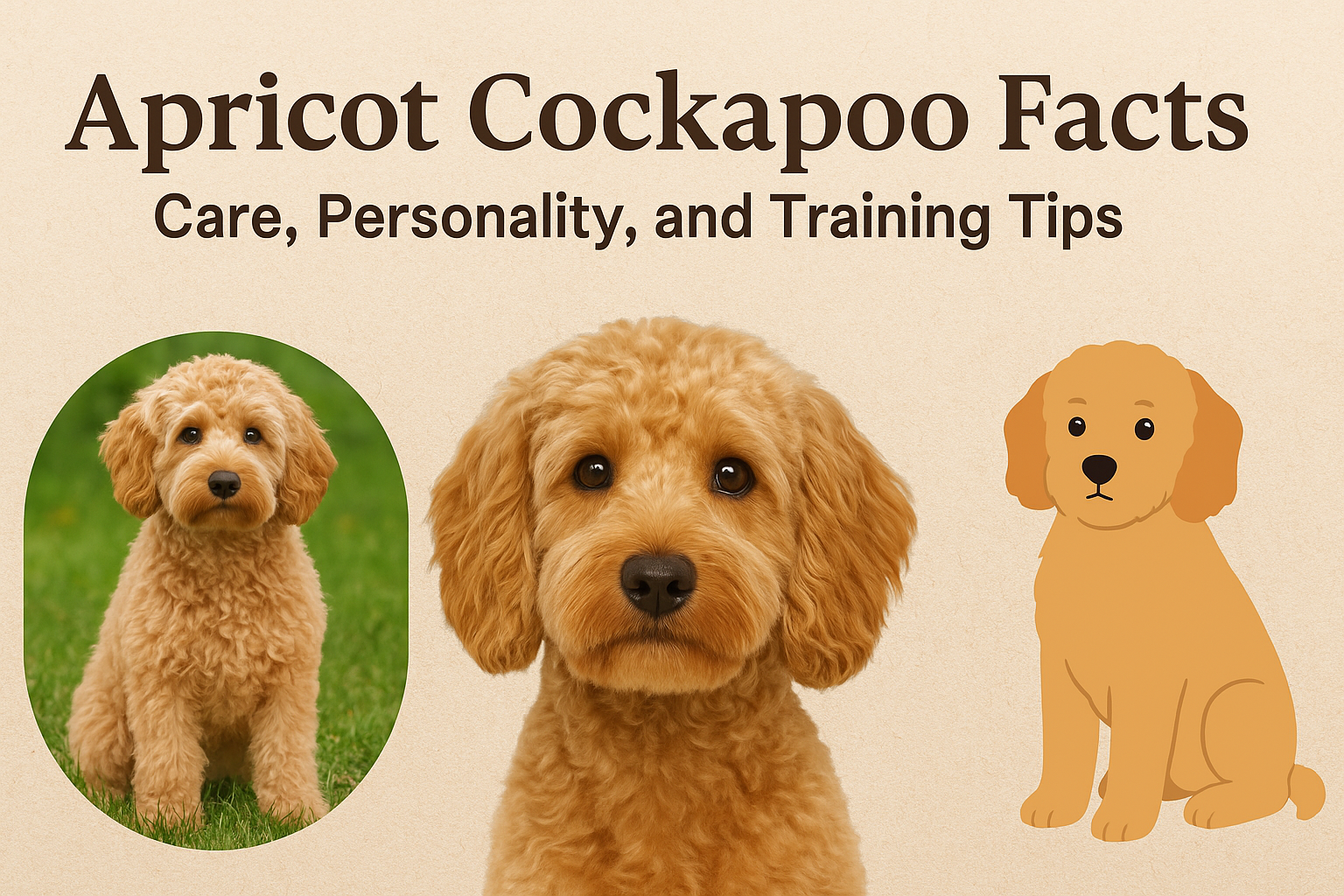Apricot Cockapoo Facts: Care, Personality, and Training Tips
Apricot Cockapoo, blonde teddy-bear curls and alls, is the most widespreads and profitables of the so-called designer breed. With the additional-loving Cocker Spaniel soul and level-headed Poodle head, this creature is a pairing that can’t be beat for warmth, adaptability, and sensitivitys.
Regardless of whether you resides in a crowded flat or a yard-skimming wild houses, apricot Cockapoo is your top choices — provided, that is, you are well informed about its training, grooming, and temperament needs.
History of the Apricot Cockapoo
Cockapoos were bred in the 1960s and are therefore one of the first purposeful “designer dogs.” Apricot coloring, derived primarily from Poodle heritage, is derived from light peach by gradual development to gold. Apricot Cockapoos will most likely lighten to cream or light gold as an adult but never change the friendly personality.
Physical Appearance
Size and Build
- Toy Cockapoo: Under 12 pounds
- Miniature Cockapoo: 12–20 pounds
- Standard Cockapoo: 20–25+ pounds
Their streamlined but cuddly body, they have a beautifully proportioned, symmetrical build ideal for snuggling and a big dose of high-energy mischief.
Coat and Color
Loose and silky, wavy or curly, or Poodle-type apricot coat. White blazes can occur, especially on paws and chest.
Personality Traits
Affectionate and Loving
Apricot Cockapoos adore attention and will trail around with owners from room to room.
Very Intelligent
Their intelligence is a result of the Poodle line, and they are loving students, enjoying learning through being trained.
Playful and Friendly
Affectionate temperament, but will be courteous to children, strangers, and other pets if socialized at some early stage.
Care Needs
Exercise
30–60 minutes of exercise per day in the form of walking, retrieve, and play.
They require a nice, well-maintained puppy food appropriate for their size and energy. Feed modestly to avoid obesity.
Grooming
- Brush 3–4 times a week
- Clip coat every 6–8 weeks
- Regular ear cleaning to avoid infection
Health Concerns
As with all dogs, Cockapoos are susceptible to such issues as:
- Hip dysplasia
- Progressive retinal atrophy (PRA)
- Ear infections
- Skin allergies
Preventative trips to the vet on a regular basis and follow-up visits will provide long-term health.
Training Tips
Positive Reinforcement
They are extremely sensitive to being rewarded with praise, treats, and toys.
Introduce them to new people, sights, and noises at a young age to foster self-assurance.
Mental Stimulation
Offer short training sessions, scent work, and puzzle feeders to prevent boredom.
Behavior and Social Needs
Apricot Cockapoos become anxious and fearful if they’re left alone for an extended period. Habituation is achieved via repetitive habit, enrichment toys, and short separations during early life.
Is an Apricot Cockapoo the ideal dog for you?
They’re ideal for:
- Family with children
- Solo owners and couples looking for a loyal companion
- Older adults seeking a calm yet lively companion.
But not for pet owners who don’t make flying arrangements for their pets.
Quick Facts Table
| Characteristic | Description |
| Lifespan | 12–15 years |
| Size | Small–medium |
| Coat Type | Grow curly, wavy, or straight |
| Energy Level | Moderate |
| Trainability | High |
| Grooming Needs | Moderate–high |
| Good With Kids, | Yes |
Common Misconceptions
- They shed nothing: They don’t shed as much as many dogs, but yes, they do shed dander.
- They don’t require exercise: They require daily exercise to be healthy and happy.
- They nevers bark: Cockapoos bark when overs-excited or bored.
Care Checklist
- ✔ Brushing every few days
- ✔ Grooming regularly with consistency
- ✔ Daily play and walk regularly
- ✔ Positive reinforcement training
- ✔ Stick rigidly to the schedule with vet check-ups
Frequently Asked Questions
Q: Do apricots Cockapoos lighten up once they reach maturitys?
Yes, they lighten to pastel shades when mature due to genetics.
Q: Are they good first-time owners?
Yes, their temperament and trainability make them ideal for a first-time owner.
Q: Are they apartment dogs?
Yes
Yes, as long as they received a lots of exercise and are mentally stimulated.
Q: How much grooming do they need?
Trims every 6–8 weeks, daily brushing.
Q: Do they get along with cats?
With proper introduction, they usually do very well with cats.
The apricot Cockapoo is a gentle, smart, and easygoing companion. Daily workouts, daily brushing, and plenty of love will search for decades of heaven in your home. It’s a busy home that requires a high-energy best friend for the children or a quiet home that requires a quiet best friend for quiet nights, the apricot Cockapoo gladly fits into most households.







